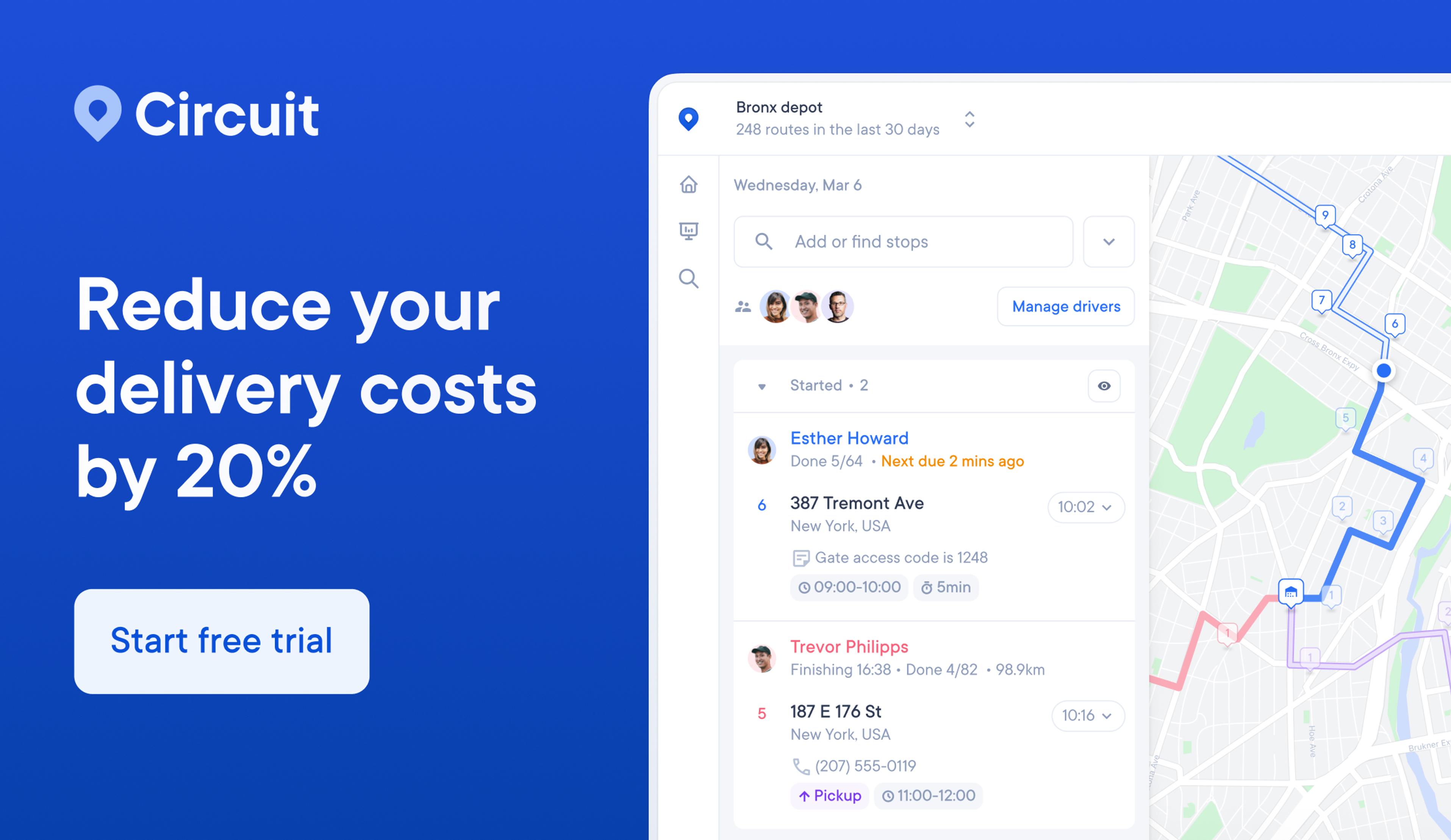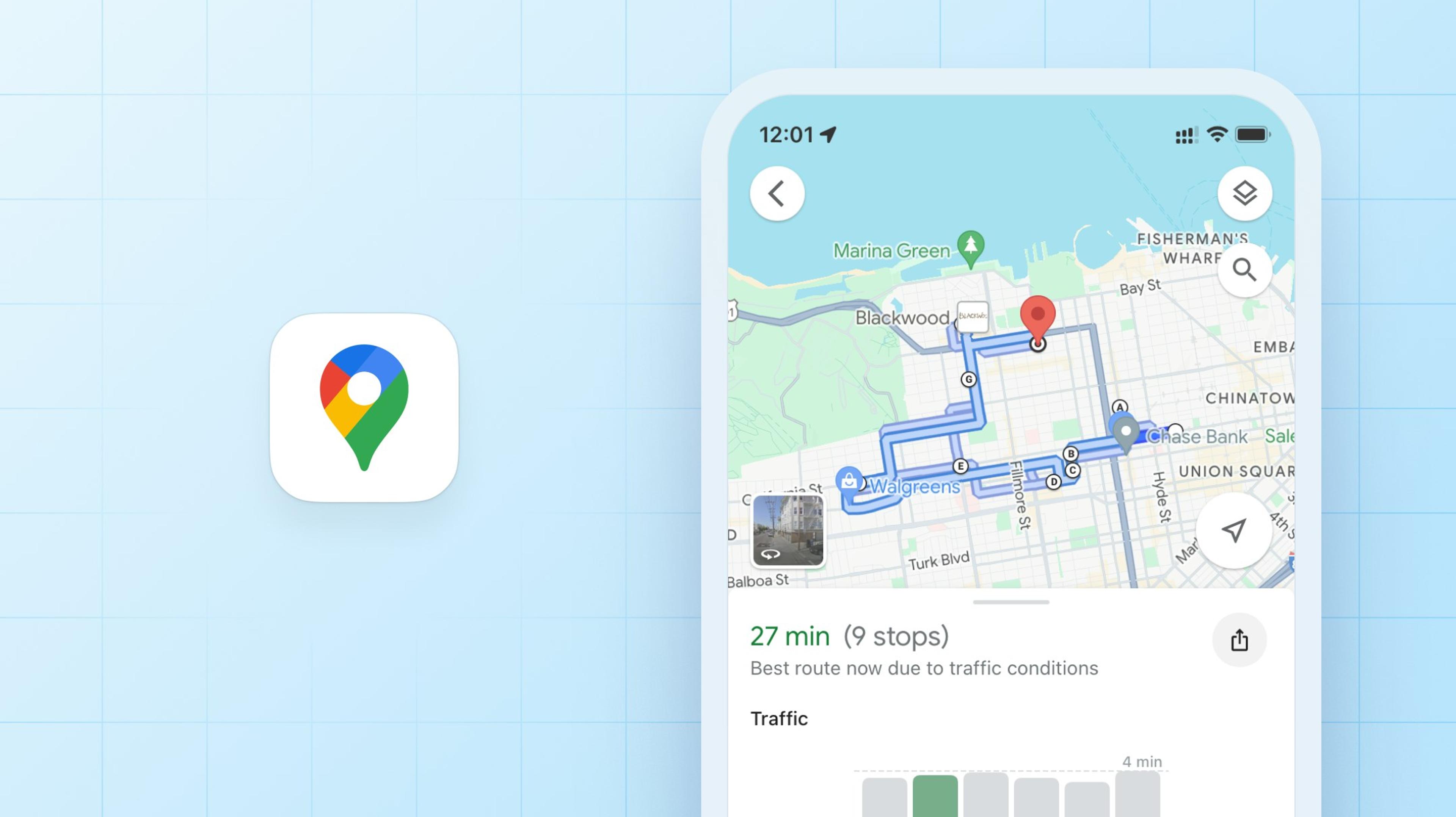The Best Medical Courier App in 2025 (+ 9 Alternatives)

In an industry where every minute counts—maybe even every second—medical couriers need all the help they can get to provide exceptional service to their clients.
Luckily, there’s help at hand—or, more aptly, at your fingertips. Medical courier apps use advanced algorithms and real-time tracking to make sure time-sensitive medical supplies reach their destinations quickly and safely. Whether it’s making sure life-saving medications are delivered on time or giving accurate delivery windows for high-priority medical supplies, medical courier apps are designed to make the delivery process as efficient and reliable as possible.
Note that when independent delivery drivers or small business owners talk about “medical courier apps”, they’re usually talking about one of two things:
- Medical courier apps that make your delivery business run 10x faster, allow you to take on more courier work, and snag those all-important medical courier contracts. These are essentially delivery route planner apps with built-in features designed specifically for the medical courier industry, like multi-stop route planning, route optimization, and live driver tracking.
- Medical courier jobs apps where you can find work. These are apps and websites that help you find medical courier contracts and make money.
If you’re thinking about becoming a medical courier but don’t know where to start, scroll to the bottom where we’ve outlined the necessary training you need.Or if you just want a list of medical courier jobs that can help you find work, we’ve got a list of those further down too.But, if you're already a medical courier or run a team of couriers, we’ve tested 10 medical courier apps that were designed to enhance your delivery operations. Here’s our verdict, including pricing and what makes them so useful for medical courier services.
1. Circuit for Teams

Circuit for Teams was designed to make delivery operations more efficient, including for medical couriers. When you’re making time-sensitive deliveries on a recurring schedule or managing medical deliveries that need close coordination, you need an app that can keep up with you.
With Circuit for Teams courier software, you can bulk upload stops via spreadsheet to generate the fastest routes with a single click. Real-time adjustments are a breeze as you can easily move or copy stops between routes, and color-coding ensures that your team never misses a beat.
The fact of the matter is, medical couriers make more money when they're supported by a delivery management software like Circuit for Teams.
Key features for medical couriers:
- Dispatcher dashboard and driver app. Manage team members, routes, and deliveries in real-time—great for medical deliveries that require close coordination.
- Minimize failed stops. Real-time tracking and updates help reduce failed stops, which is pretty crucial for time-sensitive medical deliveries.
- Accurate delivery estimates. Share arrival times with patients and facilities to manage expectations and make sure someone’s on hand to receive the delivery.
- Accurate Route optimization. Simply upload all of your medical delivery pick-ups and stops, and CFT will create the fastest route in seconds
- Multi stop route planning. Oversee your drivers routes, add, remove, copy or move and stops from one route to another. You have total control.
- Dynamic customer notifications. Keep patients, pharmacies, and healthcare facilities informed about estimated times of arrival for customer satisfaction.
- Flexible proof of delivery. Collect multiple photos or eSignatures via smartphone, which become instantly visible to dispatchers and recipients. You can now also provide proof of delivery for pickup points.
💡 Note: We built a medical courier app for drivers and medical courier services who want to 10x their earnings. See how Circuit for Teams enhance your business with speedy, safe deliveries—every single time. Try it for free for 7 days.

2. Onfleet

Onfleet is a delivery management platform designed to help delivery businesses (including medical couriers) optimize their delivery operations.
Onfleet’s real-time tracking helps with timely medical supply deliveries, and its efficient routing minimizes delays. Drivers can also conveniently capture proof of delivery by signature or photo for accountability.
Automatic delivery status alerts help you manage time-sensitive medical shipments while data analytics features enhance your operations.
Key features for medical couriers:
- Real-time tracking. Closely monitor medical deliveries, which are often time-sensitive and require special handling.
- Automated dispatching. Make sure the right courier is assigned to each delivery based on their location, availability, and vehicle capacity.
- Route optimization. Plan the most efficient routes, saving time and reducing fuel costs.
- Proof of delivery. Make sure the correct items are delivered to the right person at the right time.
3. Route4Me

Route4Me offers a platform for efficient routes, dynamic planning, and adaptable scheduling, ideal for medical courier services. It’s a good choice for medical courier companies that change routes on a daily, weekly, or seasonal basis. The rapid mobile route planning across various devices helps you monitor driver activities through GPS tracking.
Key features for medical couriers:
- Automated route planning. The routing algorithm plans the most efficient routes, accounting for traffic, road closures, and time-sensitive delivery windows.
- Real-time tracking. Monitor driver locations and delivery status in real-time to make sure deliveries are made on time and by special handling requirements.
- Flexible dispatch options. Move or copy stops between routes, color-code stops for visibility, and customize the goal of each route to match your needs.
- Complete audit trail. Keep a complete record of every order, including notes, eSignatures, barcodes, images, and videos to close the loop on data capture.
4. Track-POD

Track-POD is a delivery management system with features like electronic proof of delivery, real-time driver performance monitoring, and paperless note capabilities. It serves as both route planning software for quick multi-delivery operations and a QR/barcode scanner for load control.
Noteworthy features include GPS vehicle tracking, sign on glass, custom delivery notifications, and electronic proof of delivery templates.
Key features for medical couriers:
- Time slots and recurring routes. Make regular deliveries to the same facilities and patients as well as give accurate time slots to time-sensitive drop-offs.
- Barcode scanning. Track each product to make sure it’s delivered to the right address at the right time.
- Priority orders and customers. Deliver high-priority products first and make sure customers who need their orders get them promptly.
- Temperature monitoring. Track the temperature of deliveries in real time to make sure sensitive medical supplies are kept within the required temperature range during transit.
5. OptimoRoute

OptimoRoute lets you optimize routes and schedules based on which orders are the highest priority. It also has real-time order tracking and customizable messages to keep customers informed about their drivers’ estimated arrival time.
The Pickup and Delivery Beta feature lets you plan routes with goods from one location to another without going through your depot, making it ideal for medical courier companies.
Key features for medical couriers:
- Precision scheduling. The advanced optimization algorithms mean that time-sensitive medical products are delivered on time—you can log narrow delivery windows for medical supplies and specimens.
- Real-time adaptability. Quickly reroute in an emergency or unexpected situation.
- Temperature-sensitive routing. Factor in requirements for temperature-controlled items like vaccines and biological samples.
- Multi-stop planning. Optimize complex routes with many stops.
- Driver specialization. Match drivers with specialized training to specific medical delivery requirements.
- Proof of delivery. Get secure, electronic proof of delivery and maintain detailed records for regulatory compliance.
6. Routific

Routific is a user-friendly route optimization solution for small teams of medical couriers due to their per-driver pricing. Its drag-and-drop interface makes it easy to rearrange stops while the system optimizes routes based on real-time factors like delivery time windows and vehicle capacity.
It also offers a real-time delivery tracking link that clients can use to monitor their delivery status.
Key features for medical couriers:
- Efficient route planning. Advanced algorithms plan the most efficient routes for medical deliveries, accounting for traffic, delivery time windows, and vehicle capacity.
- Real-time tracking. Track driver locations and delivery status in real time.
- Flexible scheduling. Schedule deliveries in advance, set priority levels, and create time windows for deliveries that must be delivered at specific times.
- Proof of delivery. Get evidence of deliveries for compliance purposes via eSignatures, barcodes, and photos.
- Customer notifications. Send automated delivery notifications to customers to keep them in the loop with arrival times.
7. Tookan

Tookan is a customizable delivery management system that lets you adapt each module to your unique needs.
In addition to route planning, you can connect your eCommerce, marketplaces, carrier platforms, and enterprise resource planning (ERP) software for seamless coordination and optimization.
Key features for medical couriers:
- Real-time tracking. Monitor sensitive medical deliveries and know exactly where time-critical items are at any moment.
- Route optimization. Plan routes to minimize travel time and get as many deliveries done as possible.
- Delivery prioritization. Prioritize important medical deliveries over ones that aren’t as time-sensitive.
- Customer notifications. Keep healthcare facilities informed about incoming deliveries.
- Proof of delivery. Get secure, electronic confirmation of every medial deliver to maintain a chain of custody for medical supplies.
8. eLogii

Cloud-based delivery management platform eLogii lets you efficiently route, schedule, and dispatch deliveries, eliminating manual processes. The platform supports features like capturing signatures, utilizing barcodes, security codes, and age verification to enhance security and accuracy.
Key features for medical couriers:
- Automated route planning and optimization. Plan the most efficient routes accounting for traffic, delivery time windows, and vehicle capacity.
- Real-time driver tracking. See where your drivers are on their route and make sure high-priority deliveries are made on time and within handling requirements.
- Task status updates. Get automated updates on task status so you can stay in the know about the progress of each delivery.
- Digital proof of delivery. Confirm delivery via eSignature, barcode scanning, and photos and retain evidence for compliance purposes.
- Customer notifications. Send automated SMS and email notifications to customers to let them know when their delivery is due.
9. Detrack

Detrack is a delivery management software that offers Uber-style tracking and automated notifications by SMS and email, keeping customers informed about package location and estimated arrival time.
The E-POD system, compatible with iOS and Android devices, enables signature and photo capture, allowing you to digitize POD paperwork for organized record-keeping.
Key features for medical couriers:
- Real-time tracking. Know exactly where your drivers are and the status of each delivery in real time.
- Efficient scheduling. Plan deliveries in advance, set priority levels for each delivery, and create time windows for deliveries that rely on precise timings.
- Barcode scanning. Make sure you deliver the right items to the right person.
- Digital proof of delivery. Gather eSignatures, photos, and GPS confirmation to provide evidence for compliance.
- Real-time customer notifications. Send automated SMS and email notifications to keep customers updated on the whereabouts of their parcels.
10. GSMTasks
GSM Tasks offers effective time management, live tracking, intuitive data visualization, paperless customer service, and seamless integrations. The fast POD function lets drivers quickly send signed documents to customers once their packages get delivered.
Key features for medical couriers:
- Time management. Allows medical couriers to plan and execute their deliveries based on location and priority.
- Live tracking. Get total visibility into where your drivers and packages are at any given time.
- Recurring tasks. Link together different tasks and schedule recurring ones based on your day, week, or month.
- Customer notifications: Keep customers updated with automated SMS and email notifications that tell them when their delivery is due.
9 medical courier gig apps to find work and earn extra income
While we’re not reviewing medical courier gig apps today, we thought it might be helpful to add our expert opinion on what we consider to be the best websites and apps for medical couriers looking to find jobs:
1. GoShare
Known for its versatility, GoShare connects drivers with various delivery jobs, including potential medical courier opportunities. Its user-friendly interface and broad market presence make it attractive for those looking to break into specialized courier work. You can use any sized vehicle and can earn upward of $45/hour depending on the vehicle you use.
2. Frayt
Frayt offers on-demand delivery services, which can include medical supply transportation—particularly prescriptions. Its focus on efficiency and real-time tracking makes it appealing for time-sensitive medical deliveries. On average, Frayt drivers make $20-30/hour.
3. Curri
While primarily focused on construction and industrial deliveries, Curri's platform could potentially be used for medical equipment transport, offering a niche opportunity for couriers. Drivers can earn up to $50/hour for a return trip.
4. Bungii
Originally designed for furniture delivery, Bungii's expansion into other sectors might include medical courier services, especially for larger medical equipment. Drivers can earn up to $45/hour and deliver from the comfort of their own car.
5. Metrobi
Metrobi specializes in last-mile delivery solutions, which can be crucial for medical supply chains. Its technology-driven approach may appeal to healthcare providers looking for reliable couriers. Drivers can earn up to $1,200/week, but you need to have an SUV, minivan, van, reefer van, or box truck to qualify.
6. Senpex
Senpex offers AI-powered delivery solutions that can be particularly useful for complex medical logistics. Its emphasis on efficiency and accuracy aligns well with medical courier requirements. Drivers can earn up to $23/hour—all you need is your own vehicle and two years of driving experience.
7. Dropoff
Dropoff specifically caters to industries requiring secure, professional courier services, including healthcare. This platform is an excellent choice for those seeking dedicated medical courier opportunities. Drivers get paid by the delivery, but you need to be over 21 and have a vehicle that’s less than 10 years old.
8. Lab Logistics
Lab Logistics specializes in medical specimen and supply transportation, making it an ideal platform for those specifically interested in medical courier work. Its focus on healthcare compliance is a significant advantage. Drivers have to submit an application form to get started.
9. Priority
While not exclusively medical, Priority's courier services often include medical deliveries, providing another avenue for aspiring medical couriers. Drivers must submit an application to get started, but note that the hours are set—you don’t get to choose when you work.
Medical Courier FAQs
What’s a medical courier?
A medical courier or medical delivery driver is a professional responsible for transporting sensitive medical materials, specimens, documents, equipment, and supplies between health care facilities, laboratories, clinics, hospitals, and other medical institutions.
This essential role helps maintain the efficiency and effectiveness of healthcare operations, ensuring time-sensitive items are delivered promptly and securely.
Responsibilities of a medical delivery service often involve transporting items like medical specimens for testing, pharmaceuticals, medical records, X-rays, and equipment needed for medical procedures.
Accuracy and speed are of utmost importance to prevent delays in patient care, diagnostic processes, and treatment protocols.
What are the benefits of becoming a medical courier?
This role not only offers potential benefits for personal flexibility and autonomy but also contributes to the smooth functioning of healthcare services. Here are the main reasons to take it on:
- Flexible schedule. Many medical couriers work on demand as independent contractors, allowing them to set their own working hours. This flexibility can be especially appealing to those seeking work-life balance.
- Autonomy. As an independent contractor, a medical courier becomes their own boss. This autonomy can empower couriers who like having control of their own work.
- Varied work environment. Medical couriers often travel to different healthcare facilities and laboratories, which offer a diverse and dynamic work environment.
- Job demand. The healthcare industry is constantly in need of reliable medical couriers because of the ongoing need for medical supply delivery.
- Part- or full-time work. Becoming a medical courier can be a suitable option for anyone looking for part- or full-time opportunities.
How to become a medical courier
Becoming a medical courier driver involves a blend of logistical and interpersonal skills along with a strong commitment to maintaining the quality and security of medical deliveries.
- Basic requirements. Typically, you’ll need a valid driver’s license and a clean driving record — no accidents, points, or moving violations.
- Background checks. Many healthcare institutions require background checks for the safety and security of medical materials and patient information.
- HIPAA compliance. You need to be familiar with the Health Insurance Portability and Accountability Act (HIPAA) since you might come in contact with sensitive patient information during deliveries.
- Vehicle requirements. Depending on the type of items being transported, couriers might need a vehicle that meets specific criteria, such as temperature-controlled compartments for transporting specimens or medications.
- Training and certification. Some healthcare facilities may need you to be trained on handling medical items safely and maintaining specimen integrity during transport.
- Networking. Building relationships with local healthcare institutions, laboratories, and clinics can help you establish yourself as a reliable medical courier.
Circuit for Teams: just what the doctor ordered
From real-time tracking to route optimization and temperature monitoring, these medical courier apps address the unique challenges faced by the healthcare industry head-on.
If you’re looking for an app that combines powerful route optimization with all the necessary features you need for speedy, safe deliveries, Circuit for Teams is the perfect choice. We might be biased, but it really does have everything you need, from multi-stop route planning and dynamic customer notifications to flexible proof of delivery options and real-time driver tracking.
Circuit for Teams is tailor-made to meet the high-stakes demands of medical deliveries. Its user-friendly interface, coupled with features like barcode tracking and dispatcher dashboard, makes it the go-to choice for courier companies looking to streamline their operations and deliver life-saving supplies with precision and speed.
See how Circuit for Teams can cut your delivery expenses by 20% and transform your medical delivery business. Try it for free.


